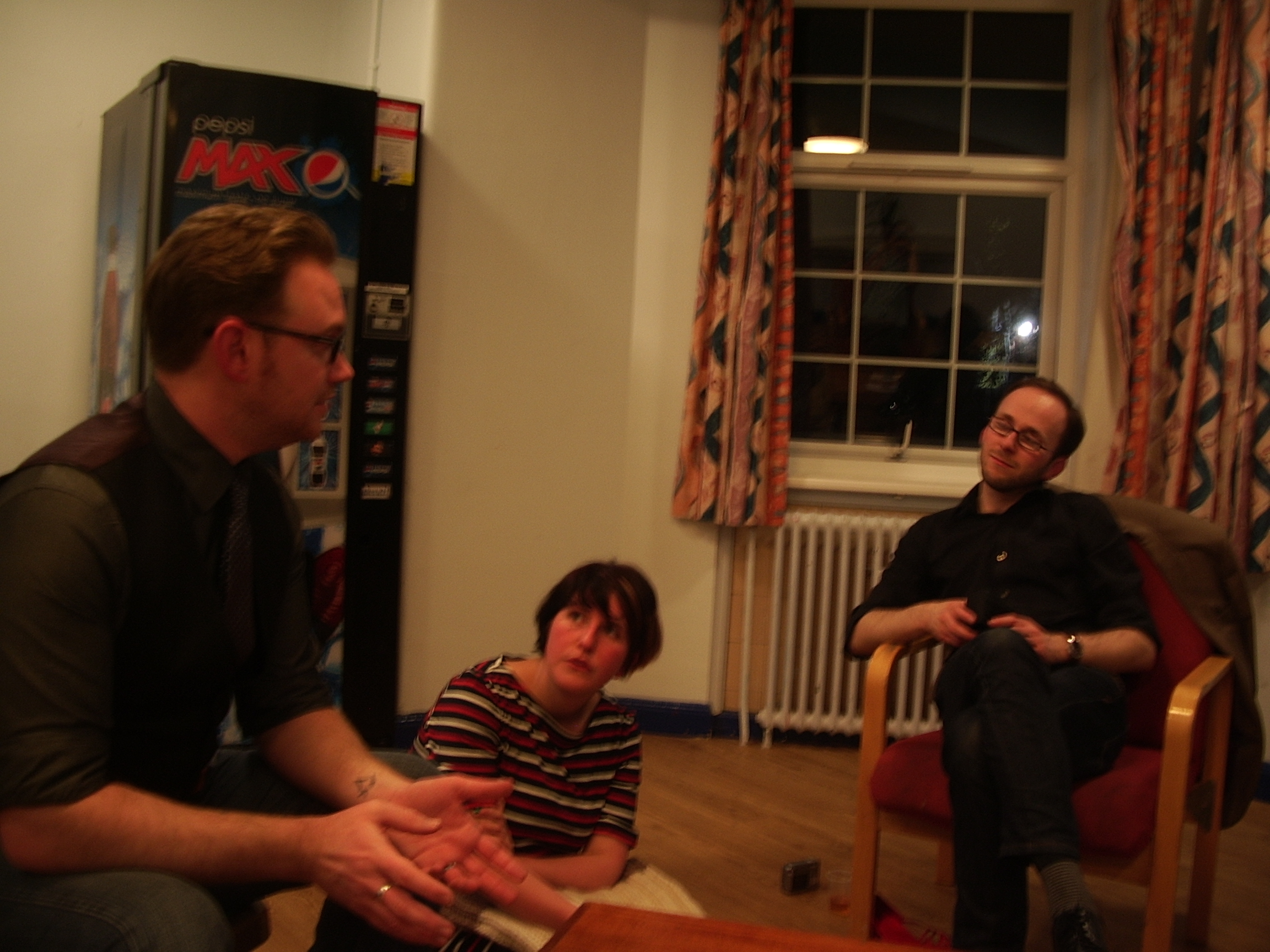We have another ‘treat’ for you this week – we’ll let you decide whether that was an accurate description or not – in the form of another roundtable discussion, with a slightly different group of people. This was recorded late on the 28th of March at the University of Chester during the British Sociological Association’s Sociology of Religion Study Group (SOCREL for short)’s conference (although, of course, this is an ‘unofficial’ discussion).
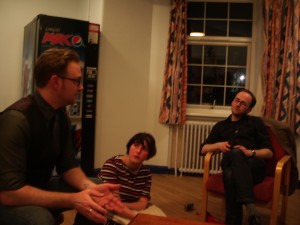
The topic of discussion grew out of a presentation delivered by Callum Brown at the University of Edinburgh (at the same time as we recorded our podcast with him) on the topic of “People of no religion: The demographics of secularisation in the English speaking world since 1900”, which presented, amongst other things, some conclusions from large-scale demographic surveys of religious identification. Ethan Quillen disagreed forcefully that conclusions drawn from questionnaires and censuses can be used to draw large-scale conclusions, and tabled the motion, “Can We Trust the Social Sciences?”
If you are new to the podcast – this is not what we usually do. If you are a regular listener – you might enjoy this, or you might not; either way, we are back to normal with Jolyon Mitchell’s interview on Religion, Media and Violence on Monday. For an interesting and more rigorous response essay to this podcast, please see Tim Hutchings’ A Response to Callum Brown: Connecting “When” and “Why” in Digital Religion.
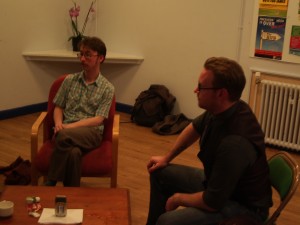
Conversation ranges from the strengths and weaknesses of such data, whether there is more to the social sciences than quantitative methods, and the place of the social sciences within a multi-disciplinary Religious Studies field. Can we trust social sciences when we study religion? Is a social scientific approach the future of religious studies? What is an alternative to a social scientific approach? These questions and more form the basis for what we intend to act as a bridge between our previous roundtable (“What is the Future of Religious Studies?”) and our forthcoming roundtable (“Should scholars of religion be critics or caretakers?”), timetabled for release on 6 June 2012.
Discussion largely focussed upon Quantitative Methods… something which future podcasts with Ariela Keysar and David Voas shall be focusing on more explicitly:
Do social scientists depend upon assumptive reasoning when it comes to filling in the blanks in their data? Does a decline in church attendance mean a decline in conviction, or simply a decline in one’s attendance at church? By providing boxes do we force people into boxes? What does one individual tell us about a category? What is it specifically about religion that makes this such an issue? How do we trust people to answer in a certain way?
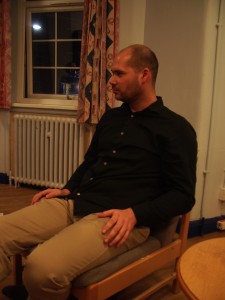
Reference is made to the panel session on Religious Conspiracies at which David, Kevin and Ethan had presented earlier in the day. We also refer to Tom Rees’ excellent Epiphenom blog. Ethan plays Devil’s advocate, whilst Chris throws himself on the pyre and asks Ethan what he thought was wrong with his approach in his MSc Thesis.
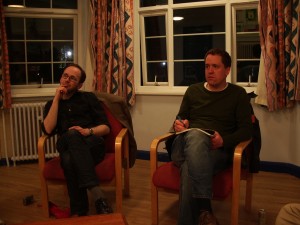
It was late… two thirds of the panel had been up since 7 am travelling down from Edinburgh.
The conclusion? Should there be a balance between quantitative and qualitative approaches? Well… yes. But individual scholars may have to side with one or the other. We need a holistic approach, and this isn’t generally something one scholar can accomplish by themselves…
Sponsored by Pepsi Max, and pink gin.
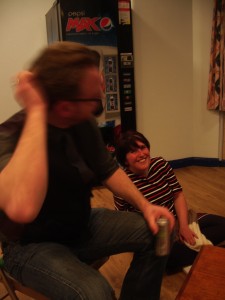
The Discussants:
Katie Aston
 Having completed a BA (hons) in Fine Art at Wimbledon School of Art in 2006, Katie went on to complete her Masters in Social Anthropology at Goldsmiths University, with a dissertation investigating gender performance within contemporary Stand Up comedy in London. Building on a pilot study of the Atheist Bus Campaign, she is currently undertaking an ethnographic study of non-religious value construction and material cultures. She is looking specifically at rationalism and the role Christian heritage within non-religious individuals and organisation, taking a historical perspective from the freethought archives of Bishopsgate Institute. Katie is an Assistant Editor at NSRN Online, the web presence of the Nonreligion and Secularity Research Network.
Having completed a BA (hons) in Fine Art at Wimbledon School of Art in 2006, Katie went on to complete her Masters in Social Anthropology at Goldsmiths University, with a dissertation investigating gender performance within contemporary Stand Up comedy in London. Building on a pilot study of the Atheist Bus Campaign, she is currently undertaking an ethnographic study of non-religious value construction and material cultures. She is looking specifically at rationalism and the role Christian heritage within non-religious individuals and organisation, taking a historical perspective from the freethought archives of Bishopsgate Institute. Katie is an Assistant Editor at NSRN Online, the web presence of the Nonreligion and Secularity Research Network.
Christopher R. Cotter
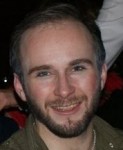 Chris recently completed his MSc by Research in Religious Studies at the University of Edinburgh, on the topic ‘Toward a Typology of Nonreligion: A Qualitative Analysis of Everyday Narratives of Scottish University Students’. He is currently taking a year out from study to pursue PhD applications, present at conferences, and work on projects such as this. His future research will continue to expand the theme of ‘non-religion’ to apply to ‘everyone’ in religiously diverse, socio-economically deprived urban environments, simultaneously deconstructing the religion-nonreligion dichotomy in the process. He is Deputy Editor and Bibliography Manager at the Nonreligion and Secularity Research Network, and currently editing the volume ‘Social Identities between the Sacred and the Secular’ with Abby Day and Giselle Vincett (Ashgate, 2013). See his personal blog, or academia.edu page for a full CV.
Chris recently completed his MSc by Research in Religious Studies at the University of Edinburgh, on the topic ‘Toward a Typology of Nonreligion: A Qualitative Analysis of Everyday Narratives of Scottish University Students’. He is currently taking a year out from study to pursue PhD applications, present at conferences, and work on projects such as this. His future research will continue to expand the theme of ‘non-religion’ to apply to ‘everyone’ in religiously diverse, socio-economically deprived urban environments, simultaneously deconstructing the religion-nonreligion dichotomy in the process. He is Deputy Editor and Bibliography Manager at the Nonreligion and Secularity Research Network, and currently editing the volume ‘Social Identities between the Sacred and the Secular’ with Abby Day and Giselle Vincett (Ashgate, 2013). See his personal blog, or academia.edu page for a full CV.
Matthew Francis
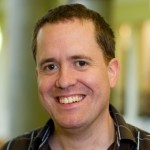 Matthew graduated from Leeds with a joint-honours degree in Philosophy and Theology and Religious Studies. He subsequently undertook a Masters by Research, where he examined the ideas of Georges Bataille in relation to the problem of meaning in death in contemporary society. Matthew is the Postgraduate Officer for the Sociology of Religion study group (SocRel) of the British Sociological Association (BSA). He has taught on undergraduate and postgraduate modules on subjects including the Sociology of Religion and Religion in Modern Britain.
Matthew graduated from Leeds with a joint-honours degree in Philosophy and Theology and Religious Studies. He subsequently undertook a Masters by Research, where he examined the ideas of Georges Bataille in relation to the problem of meaning in death in contemporary society. Matthew is the Postgraduate Officer for the Sociology of Religion study group (SocRel) of the British Sociological Association (BSA). He has taught on undergraduate and postgraduate modules on subjects including the Sociology of Religion and Religion in Modern Britain.
Matthew recently completed an AHRC-funded PhD at Leeds, which investigated the move to violence in the beliefs of groups. He is the editor for RadicalisationResearch.org, an AHRC/ESRC funded website which provides a resource for policy-makers and the media on radicalisation and extremism, and works at Goldsmiths University managing the Religious Literacy Leadership Project.
Ethan Quillen
 Circular Academia: Navigating the Dangerous Waters of Term Re-Assignment for the Religious Studies Project.
Circular Academia: Navigating the Dangerous Waters of Term Re-Assignment for the Religious Studies Project.
David G. Robertson
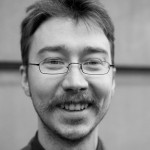 David G. Robertson is a Ph.D. candidate in the Religious Studies department of the University of Edinburgh. His research examines how UFO narratives became the bridge by which ideas crossed between the conspiracist and New Age milieus in the post-Cold War period. More broadly, his work concerns contemporary alternative spiritualities, and their relationship with popular culture. Forthcoming publications: “Making the Donkey Visible: Discordianism in the Works of Robert Anton Wilson” in C. Cusack & A. Norman (Eds.), Brill Handbook of New Religions and Cultural Production. Leiden: Brill (2012) “(Always) Living in the End Times: The “rolling prophecy” of the conspracist milieu” in When Prophecy Persists. London: INFORM/Ashgate (2012). For a full CV and his MSc thesis on contemporary gnosticism, see his Academia page or personal blog.
David G. Robertson is a Ph.D. candidate in the Religious Studies department of the University of Edinburgh. His research examines how UFO narratives became the bridge by which ideas crossed between the conspiracist and New Age milieus in the post-Cold War period. More broadly, his work concerns contemporary alternative spiritualities, and their relationship with popular culture. Forthcoming publications: “Making the Donkey Visible: Discordianism in the Works of Robert Anton Wilson” in C. Cusack & A. Norman (Eds.), Brill Handbook of New Religions and Cultural Production. Leiden: Brill (2012) “(Always) Living in the End Times: The “rolling prophecy” of the conspracist milieu” in When Prophecy Persists. London: INFORM/Ashgate (2012). For a full CV and his MSc thesis on contemporary gnosticism, see his Academia page or personal blog.
Kevin Whitesides
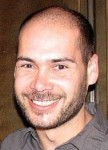 Kevin Whitesides completed his B.A. in Religious Studies at Humboldt State University. He is currently developing an MSc dissertation at the University of Edinburgh on ’2012′ millennialism as part of a broader emphasis on countercultural transmission. Kevin has contributed articles to ‘Archaeoastronomy’ and ‘Zeitschrift fur Anomalistik’, has contributed chapters for two anthologies on apocalypse and prophecy, and has presented widely on the ’2012′ milieu at academic conferences and universities.
Kevin Whitesides completed his B.A. in Religious Studies at Humboldt State University. He is currently developing an MSc dissertation at the University of Edinburgh on ’2012′ millennialism as part of a broader emphasis on countercultural transmission. Kevin has contributed articles to ‘Archaeoastronomy’ and ‘Zeitschrift fur Anomalistik’, has contributed chapters for two anthologies on apocalypse and prophecy, and has presented widely on the ’2012′ milieu at academic conferences and universities.

